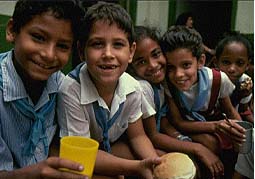|
|
|

Education
Home |
Site
Tour | Rights
| Policies
| Themes |
Publications
| Links
Policies - UNICEF's Vision for
Education
Based on the
principles of the Convention on the Rights of the Child, the
expanded vision of basic education articulated in the World
Declaration on Education For All, and the Dakar Education Framework,
and in partnership with governments, other UN organizations,
bilateral agencies, non-government organizations, and civil society,
UNICEF commits itself to the following vision:

All children will be able
to fulfil their right to education, meet their basic learning needs,
realise their full potential, and participate meaningfully in
society. This will be achieved through access to high quality,
child-friendly learning environments, including:
- Comprehensive
early childhood care
- Quality
primary schools and equivalent education programmes
- Expanded
opportunities for adolescent education, participation, and
development
- Supportive
families and communities that enable children to acquire a quality
basic education
Education's priorities
are:All
children will realise their right to basic education of good
quality.
FOR ALL CHILDREN - help them learn what
they need to learn in rights-based, child-friendly learning
environments
- child-seeking --
acting to look for children not in school, get them in school, and
ensure they are included in learning
- child-centred -- promoting the bests
interest of the child
FOR YOUNG CHILDREN - enrich their
development and early learning
FOR EXCLUDED CHILDREN - get all
into school and help them stay there
FOR GIRLS - ensure that they have full
and equal access to, and achievement in, basic
education
FOR CHILDREN IN CONDITIONS OF CRISIS -
ensure that they can start learning again, in safe and stable
spaces
FOR CHILDREN AFFECTED BY HIV/AIDS -
ensure they have the education needed to respond to all aspects of
the pandemic, and the resources to do so
DESIRED OUTCOMES FOR CHILDREN
 to learn
what they need to learn - for learning throughout life to learn
what they need to learn - for learning throughout life
 to be able
to learn in environments that are effective, inclusive, healthy and
protective, gender-sensitive, and involved with children, families,
and communities to be able
to learn in environments that are effective, inclusive, healthy and
protective, gender-sensitive, and involved with children, families,
and communities
 to be
healthy, well-nourished, and free from exploitation and violence --
and from labour which interferes with learning to be
healthy, well-nourished, and free from exploitation and violence --
and from labour which interferes with learning
 to be
aware of their rights and have opportunities to realise
them to be
aware of their rights and have opportunities to realise
them
 to be able
to protect themselves and develop to their full potential to be able
to protect themselves and develop to their full potential
 to be able
to participate in decisions which affect their lives in accordance
with their evolving capacities to be able
to participate in decisions which affect their lives in accordance
with their evolving capacities
 to respect
diversity, practice equality, and resolve differences without
violence to respect
diversity, practice equality, and resolve differences without
violence
UNICEF's core
messages and strategies in education helped to shape, and were in
turn shaped by, the World Education Forum held in Dakar, Senegal, in
April, 2000. This Forum, attended by more than 1500 participants
from 182 countries, 150 civil society organisations, and numerous
bilateral and multilateral development agencies, endorsed the Dakar
Framework for Action.
This Framework
confirms the expanded vision of education outlined 10 years ago at
the World Conference on Education for All (EFA) in Jomtien,
Thailand, and proposes a new set of time-bound goals and strategies
in basic education for the new decade and beyond.
These goals
encompass:
- expanded and
improved comprehensive early childhood care and education;
- access to,
and completion of free, compulsory primary education of good
quality for all children, especially for girls and children in
disadvantaged groups;
- elimination
of gender disparities in primary and secondary education and
achievement of gender equality in education, with a special focus
on access and achievement for girls;
- improvement
of the quality of education and achievement of measurable learning
outcomes, especially in literacy, numeracy and essential life
skills;
- appropriate
learning and life skills programmes for young people and
adults;
- improvements
in adult literacy levels, especially for women, and in access to
basic and continuing education for adults.
UNICEF is now
working to deliver on commitments made at Dakar to support the
achievement of these goals - in particular, those which support our
own messages and objectives in education.
We will do this
by:
- providing
technical support and material assistance to priority areas in
basic education, to ensure that children get to school, stay in
school, learn and achieve;
- supporting
the development of national EFA plans and of basic education
policy, especially policy which ensures an education that is
inclusive, child-centred and gender-equitable;
- advocating to
national decision-makers and international partners for more
efficient - and increased - investment in basic education.
Ten years after
the World Summit for Children (WSC) endorsed a Declaration and The
Dakar Framework for Action, the world is now preparing to review
progress toward WSC goals and propose new targets and strategies to
complete the unfinished business of 10 years ago and meet the new
challenges facing children in the first decade of the 21st century.
As part of this process and at the request of the Secretary General
of the United Nations, UNICEF is facilitating the development of a
New Global Agenda for Children focused on three critical outcomes
for children: early childhood development, basic education, and
adolescent development and participation. This Agenda will be
endorsed by a Special Session on Children which the United Nations
General Assembly is holding in New York in September,
2001.
The targets,
strategies, and indicators being drafted for this Agenda will be
discussed and modified through wide-scale consultation with
governments, non-government and civil society organisations, and
funding agencies.
|
| |



